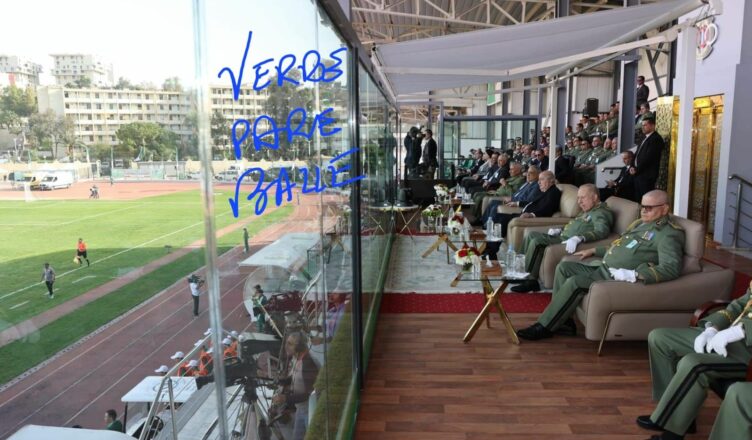During the final of the Military Football Cup, recently held at the Center for Gathering and Training of Military Sports Teams (CREPESM) in Ben Aknoun (Algiers), President Abdelmadjid Tebboune, alongside General Saïd Chengriha, attended the ceremony with numerous high-ranking military officials, all protected by bulletproof glass, according to observers.
The decision to reinforce security at the podium reflects the political and military tensions currently shaking Algeria. This move echoes the particularly delicate political and institutional context, marked by changes in the military hierarchy and internal conflicts within the National People’s Army (ANP).
Algeria has been going through a period of political turbulence since the 2019 crisis, which led to the resignation of President Abdelaziz Bouteflika and the establishment of the current government. This crisis triggered a reform process that has shaken the power structures and affected the relationships between different military and political factions.
Evidence of this unrest includes the imprisonment of over 150 high-ranking officers, including 60 generals, an unprecedented situation in the country’s contemporary history. Some of these officers have been accused of corruption, abuse of power, and involvement in plots to destabilize the state, while others claim that the political repression aims to weaken military figures loyal to the former system.
The detention of these generals under harsh conditions, notably at the Blida military prison, has exacerbated tensions within both the army and society, fueling rumors of internal power struggles.
In this context, the installation of bulletproof glass around the presidential podium is seen as a security measure driven by the fear of unrest or incidents. General Saïd Chengriha, the Chief of Staff of the ANP, who welcomed President Tebboune, represents the central figure of the current military power. However, the situation remains tense, with rival military factions that might view this event as an opportunity to express opposition, or even disrupt the ceremony.
Although the Military Football Cup final is primarily a sporting event, it takes place in an atmosphere where political and military stakes overlap, and where every gesture is scrutinized by those vying for power.
The Military Football Cup, beyond its sporting aspect, carries a symbolic dimension. It highlights the Algerian Army as a central institution and sends a message of national unity. However, the conditions of detention for the incarcerated generals and the repercussions of the sometimes severe and controversial repressive measures underscore the deep divisions within both the army and the Algerian state.
The choice for increased security can be interpreted as a desire to prevent any attempt at destabilization during events where the symbols of the state are at play. While the ANP officers, who contributed to the fight against terrorism in the 1990s, now face public humiliation and imprisonment, sometimes viewed as politically motivated, the protection of the president and his allies reflects growing concern over internal rivalries and the persistent instability.
These bulletproof windows symbolize a National People’s Army that, while unified around certain core values, is increasingly facing internal divisions, rivalries, and a climate of mistrust. In this context, every security measure, even a symbolic one, becomes a marker of the regime’s fragility and concerns about the country’s political and military future.

